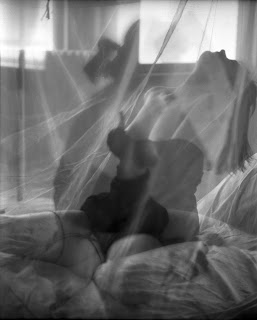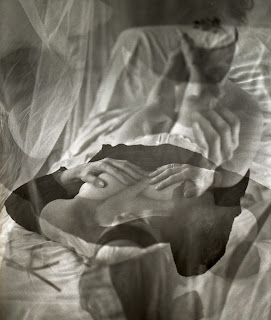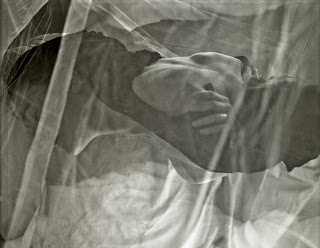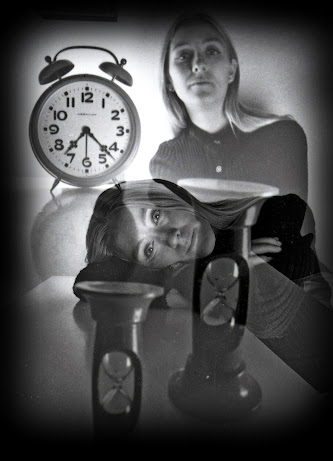El Mosquitero Por Tercera Vez
Saturday, April 23, 2022
'If you'll take my advice you'll get a needle and cotton and start
right in to mend the mosquito net,' she said, 'or you'll not be able to
get a wink of sleep tonight.'
The Trembling of a Leaf - W. Sommerset Maugham
I wrote this blog about the mosquito net related to a quote
by Somerset Maugham above. And this one with a story by Julio Cortázar that has no
translation.
I would like to go to those two blogs with new photographs.
Not exactly the new ones as I have modified the negatives of my original
session with a poet by scanning two negatives at a time.
I was inspired by the death of Jerry Uelsmann in the beginning
of April who did lovely and startling work before Photoshop came into the
picture. I wrote about that here. And then I wrote a blog with additional scanner negative sandwiches in the link below..
The Excitement of the Smell of Metal
The Hour Glass
With thousands of negatives and slides I have a new
project going here which keeps me off the streets and busy from thinking too
much of the absent presence of my
Rosemary.
My Excitement & the Smell of Metal
Friday, April 22, 2022
 |
Bronwen - December 2013
|
It was around 1958, while at St. Edward’s High School,
a Roman Catholic boarding school in Austin, Texas that Brother Emmett, who was
in charge of the PX, told me that I had a package. The package was from Olden
Camera in New York. Inside the shiny box there was a brand new Pentacon-F single
lens reflex. This was my first real camera. I was excited. I will
never forget the smell of the metal of the camera and the determined shutter click. Since today April 22, 2022,
I can look at my Pentacon-F here in my office and to assert that it is in
perfect working order. I can re-live that
excitement.
Something like that feeling of excitement has hit me as in
this last week that I have been at making my scanner negative sandwiches. I wrote
about the process here.
I am going through my extensive files and I even (to my
delight) thought of two negatives of my Rosemary. When I scanned the pair the
result was perfect the first time. It is here.
Because most of my peers have died, disappeared or switched
from their film and digital cameras to their phones, I feel a tad isolated. But
my excitement is not diminished.
The pictures here are of my longtime friend and subject
Bronwen Marsden. She has always been a delight to photograph. I believe I could have
a big stomach ache if I were to sandwich all the pictures I have of her. Who
knows I just might do that.
Swatting Flies With My Tail
Thursday, April 21, 2022
 |
Alex and Abuelita - 1951 - Buenos Aires
|
In recent years I have been told that just because I am an
old man it does not mean that anybody has to respect me.
I do not understand that. I was raised not only by my
mother but also by my grandmother who by 1969 had advanced Alzheimer’s. She got
to meet my Rosemary in Veracruz.
All my life my abuelita gave me advice that came from a Don
Quixote via Sancho Pancho and also with a smattering of Spanish from Spain or from Spanish from Argentina.
My favourite was, “El diablo más sabe por viejo que por
diablo,” which translates to, “The devil knows more not because he is the devil
but because he is an old man.” Close
to that was, “Cuando el diablo no tiene que hacer con el rabo espanta moscas.” That
delightufully translates to, “When the
devil is bored he swats flies with his tale.”
My grandmother took me to the movies and when my mother was
about to whip me with her Chinese slippers she would intervene and point out
that I was an artist just like she was and that she should spare me the
punishment.
Now in this century seeing how I adored, admired and
respected my grandmother I cannot understand the treatment I sometimes get.
In order to stay centered, particularly this melancholic
year in my life, I return to two writers. One of them is Harold Bloom and I have
many of his books. But there is one in particular called How to Read and Why. I have written about it many times but I will
put the important quote below:
There is no single way to read well, though there is a
prime reason why we should read. Information is endlessly available to us;
where shall freedom be found? If you are fortunate, you encounter a particular
teacher who can help, yet finally you are alone, going on without further
mediation. Reading well is one of the great pleasures that solitude can afford
you, because it is, at least in my experience, the most healing of pleasures.
It returns you to otherness, whether in yourself or in friends, or in those who
might become friends. Imaginative literature is otherness, and as such
alleviates loneliness. We read not only because we cannot know enough people,
but because friendship is so vulnerable, so likely to diminish or disappear,
overcome by space, time, imperfect sympathies, and all the sorrows of familial
life.
Perhaps it is because of Covid that I have been
experiencing Bloom’s
but because friendship
is so vulnerable, so likely to diminish or disappear, overcome by space, time,
imperfect sympathies, and all the sorrows of familial life.
Many of my friends are dead and many others have drifted
off. I sometimes think I may have phone bad breath.
The other writer is Joan Didion. I do not have any of her
books but after she died in late December I noticed a quote of hers:
“I write entirely to find out what I'm thinking, what I'm
looking at, what I see and what it means. What I want and what I fear.”
What is most interesting is that American photographer Gary Winogrand wrote something that is close
to Didion.
“I write entirely to
find out what I'm thinking, what I'm looking at, what I see and what it means.
What I want and what I fear.”
And so with Joan Didion, Harold Bloom,Gary
Winogrand and with some help from my
Abuelita I believe my compass is on a true course.
I find that writing my daily blog and somehow, in some way
connecting almost every one to the memory of my Rosemary, I feel calmed
and a tad less melancholic. Winogrand’s statement about taking photographs to
see what one sees, so close to Didion, has enthused me to explore new ways of exploring
my photography and going in directions that are all new. I believe that in
spite of being an almost 80-year-old man it is cutting edge.
It was Erich Fromm who wrote that in order to love one had
to love oneself. Could it be that to find respect one must first respect
oneself?
Brian Preston, Dennis Hopper & Yours Truly
Wednesday, April 20, 2022
 |
| Bruce Conner (in tub), Toni Basil, Teri Garr and Ann
Marshall, 1965 - Photo by Dennis Hopper who was documenting the Los
Angeles Art Scene in the mid-60's |
One of the wonders of this strange 21st century
is that communication is altogether different and surprising from that conventional last one.
Sometime in the 80s I worked once with then Vancouver
Magazine sports writer Brian Preston. I remember having to photograph three
Vancouver Canucks. According to my files where I found the negatives and this
scanned photograph I have written on the file envelope 3 Czechs. I thought they
might have been Finns.
Brian Preston lives in Victoria, B.C. and I recently received
a short communication with a link to a photograph.
.
Hi Alex,
Just messaging you to
share a post that came up on my feed today-- I really enjoy your multitude of
posts, and when this one arrived it took me awhile to clue in that the guy in
the tub was not you, because it looked so much like an Alex W-H photo...
And of course I do have a connection with Dennis Hopper
as I did photograph him in Seattle in 1988 for the Georgia Straight.
Rosemary's Birthday - the hour glass, severe & sombre, in the god’s right hand
Tuesday, April 19, 2022
It was sometime around 1988, two years after we had moved to
the large corner garden in Kerrisdale, when Rosemary informed me that in the
evening we were going to a meeting of the Vancouver Rose Society. We went.
I was sitting on an uncomfortable chair at the Floral Hall
of VanDusen Botanical garden looking at 100 bad slides of roses. I could not
believe I had been dragged to something that boring.
As a few years passed I became as keen on Roses as Rosemary
and by 1990 our garden was a paradise of varied plants including many roses.
Rosemary in all her wisdom prepared me for a life love of
plants and roses and all that led to my scanning those plants beginning in
2001. It would seem that Rosemary always knew what I would like even though
there had to be some not too gently coaxing.
Today, April 19, 2022, Rosemary’s birthday, I went to my
first in-person meeting of the Vancouver Rose Society at the Floral Hall.
It was mostly a happy occasion to be in a roomful of people
with similar tastes. At the same time it was impossible for me not to think of
the many pleasant times that Rosemary and I had in those meetings.
This last week I have been experimenting with a new
technique that I call scanner sandwich negs. I wrote about it here.
But today, in such an important day I thought that the least
I could do was to do a sandwich scan of Rosemary. I believe I chose the two
perfect negatives for this. It is all about time. In a previous blog (this one)
I included both of those negatives separately with one of my favourite poems by
Jorge Luís Borges. While that poem is both in Spanish and in English in tha tblog I am going to place below the English version.
I have to admit that rarely did I think in all those moments
(52 years’ worth) that I would be looking back on them without having Rosemary
around. But even though it is late I have learned my lesson. As I lie in bed
with my affectionate cats I look at them and enjoy the moment and I think in a
future when either they or I will no longer be together.
I am furthermore saddened today by the fact that both
Rosemary and I did not believe in a hereafter. We knew we would never see each
other again. I call this Astor Piazzolla’s Oblivion.
The Hourglass, by Jorge Luis Borges
It is appropriate that time be measured
by the stark shadow cast by a stake in summer
or by the flow of water in the river
where Heraclitus saw time’s ironies
since, seen as time and fate, they are alike:
the movement of the mindless daytime shadow
and the irrevocable running on
of river water following its flow.
Just so, but time discovered in the deserts
another substance, smooth and of some weight,
that seemed to have been specifically imagined
for measuring out the ages of the dead.
And so appears this instrument of legend
in the engravings in the dictionary,
an object graying antiquarians
will banish to a dusty underworld
of things— a single chessman, a broadsword,
now lifeless, and a clouded telescope,
sandalwood worn away by opium,
a world of dust, of chance, of nothingness.
Who has not hesitated, seeing that hourglass,
severe and sombre, in the god’s right hand,
accompanying the scythe he also handles,
the image Dürer copied in his drawing?
Through a top opening, the inverted cone
slowly lets fall the wary grains of sand,
a gradual gold that, loosening, fills up
the concave crystal of its universe.
Pleasure there is in watching how the sand
slowly slithers up and makes a slope
then, just about to fall, piles up again
with an insistence that appears quite human.
The sand of every cycle is the same
and infinite is the history of sand;
so, underlying your fortunes and your sorrows,
yawns an invulnerable eternity.
It never stops, the spilling of the sand.
I am the one who weakens, not the glass.
The rite of the falling sand is infinite
and, with the sand, our lives are leaving us.
In the timing of the sand, I seem to feel
a cosmic time: all the long history
that memory keeps sealed up in its mirrors
or that has been dissolved by magic Lethe.
All these: the pillar of smoke, the pillar of fire,
Carthage, Rome, and their constricting wars,
Simon Magus, the seven feet of earth
the Saxon offers the Norwegian King—
all are obliterated, all brought down
by the tireless trickle of the endless sand.
I do not have to save myself— I too
am a whim of time, that shifty element.





















